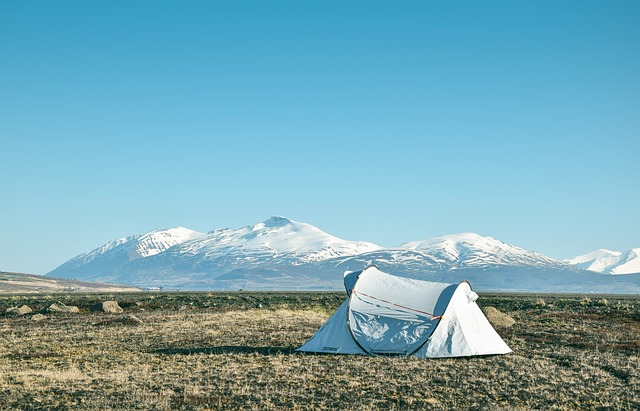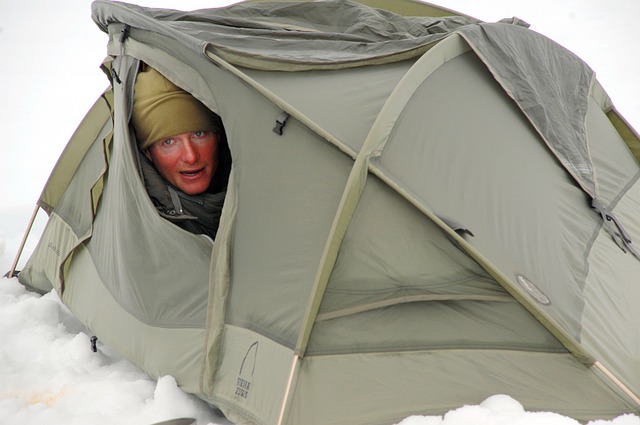Are you planning to go on a winter camping trip? Here are some tips on how to insulate a tent for winter camping. Staying warm when camping during the cold months is a problem. During the winter, cold temperatures, strong winds, and plenty of snow conspire against you, resulting in icy circumstances that make it impossible to sleep.
Even if you take some of the best and high-quality heating accessories or types of equipment, without sufficient insulation, the warmth it produces will rapidly vanish. The camping tricks and ideas listed below can help your tent maintain heat, stay comfortable and not feel cold.
Here you will be able to learn about a variety of tips and tactics from seasoned campers that will keep your toes as warm as the rest of you. One of the best things about winter camping is that there are lightweight choices available for you that are both simple to set up and inexpensive.
In order to know how to insulate a tent for winter camping, you can follow the following steps:
Bring the smallest tent you have
The smaller the tent the warmer it will be. The less room you have to heat, the more heat you keep close to you.
It may sound obvious, but if you camp year-round, that huge airy, and windy summer tent may turn into an icicle in the winter, so consider investing in a smaller winter tent to keep the heat in. When camping with a party of four people, it’s good to have the extra gear storage room that comes with a six-person tent, but all that extra room will be required to be heated and insulated if you would like to be warm at night.
As a result, choosing a smaller tent for winter camping reduces the amount of area you need to heat and insulate, allowing you to enjoy your winter camping experience more fully.

Clear The Ground
The land you may pick will play a significant part in deciding your comfort level before you ever pitch your tent. Winter camping follows the same rules as the rest of the year camping. Select a level site that isn’t too near nor too far away from the sea and is as wind-free as possible.
If you’re camping in the snow, though, you’ll need to remove the snow first. It’s possible that setting your tent above the snow may cause it to melt. It will often re-freeze, resulting in unsightly bumps and ties that will make your back ache the following morning. It can be prevented if your campsite is well cleared of snow ahead of schedule.
Insulation of the Ground
To insulate the ground of your tent, use a ground mat, rug, the amount of area you need to heat and insulate, allowing you to enjoy your winter camping experience more fully. Blanket, or even huge towels if you don’t have anything else. This can help you have a better night’s sleep by preventing or drastically reducing the chilly winter entering into your bones. There are some sleeping mats specifically created for this purpose, which are excellent for insulating you from the chilly winter ground.
With its one-and-a-half-inch-thick self-inflating mat, certain products have perfected the art of sleeping mats in winter camping.
Simply unroll it, and it will take care of the rest, taking only a few puffs from you.
Wind Breaks
Set up your tent near a windbreak you will find around naturally, such as a huge rock formation or plants. This helps to keep the chilly winds at bay.
Alternatively, you may draw one side, place the tarp over the land, and stake it down to create a windbreak using it as a lean-to. This helps to keep the heat in and the frigid air out. You may also use snow (if there is any) when camping by using a significant amount of snow to construct a windbreak. Build a thin wall some feet, by piling snow near the edge of the tent and moving more snow away from the area, you may protect the front of your tent. The reason is that cold winds are a key heat loss source in the winters, this may go a very long way in keeping you away from cold. If you can’t locate a natural windbreak, carry a canopy or windshield with you, which you may put up to keep the breeze from reaching your tent.
Put a Thermal Blanket on the Tent’s Roof
Once you’re inside and zipped up for the night, duct-taping a thermal blanket over your tent’s top will help in reflecting your body heat back to you, allowing you to keep the heat you create rather than losing it through the walls. It also comes with the additional benefit of being useful in an emergency. Just make sure you get two: one for the tent and one for your first-aid kit.

Use tent heater
If you’re anxious about staying warm, this tent heater is a good option. It’s one of the most well-known and effective. If you use an excellent electric or gas tent heater, your toes will not be cold. Keep in mind that almost all heaters that run on gas are not safe to use inside your tent. They may get burned if overheated or overturned. They may also create carbon monoxide, rapidly building up in a compact place just as a tent, resulting in death.
But in order to insulate a tent for winter camping, you will need a good tent heater, which may significantly increase your comfort. If any carbon monoxide emissions are released, this kind of heater includes a built-in sensor that can sense carbon monoxide and turn it off immediately. Similarly, if the heater is turned off, it will switch off, ensuring that you are safe for overnight usage.
Tent heaters are available in various forms and sizes, and they function similarly to a typical space heater. On the other hand, Tent heaters may be harmful if used incorrectly since they might cause a fire. If you would like to be extra careful, select a tent heater that has an automatic shut-off when it’s tipped over.
While off the grid, you can use a Jackery for electricity and operate a tiny heater for roughly three hours back-up on a full charge. The following day, the solar-powered small generator may be refueled with sunshine.
More Ways to Stay Warm and To Insulate A Tent for Winter Camping
There are a few additional alternatives to try if you’re afraid that insulating your tent won’t be enough or if you simply want to stay warm in another manner. You might also attempt to insulate yourself in addition to the tent.
Wear something on your head
A balaclava or a knit hat will keep you warm since we lose most of our body heat via our heads. It will also help you in keeping your ears warm, which has been shown to improve sleep quality.
Wear Thermals
The most important tip for keeping warm on a winter camping trip is to dress in layers. Thermal underwear is a big part of it, and it’s arguably the greatest money you’ll ever spend. They’re inexpensive, cozy, and available in various sizes and colors. If you’d like something a bit less clinging, get a larger size.
Before tackling the trails, wearing thermal socks is also a good idea. Always include a spare pair of socks to keep your feet dry since cold, damp feet are one of the leading causes of pain, illness, and even frostbite.
A Warm Sleeping Bag
Using a normal sleeping bag in 10-degree temperatures is a bad idea, as should go without saying. You’ll be much more comfortable in the morning if you choose a heavy and thick, well-insulated sleeping bag. The greatest winter bags will often be befitting, having a cut form to imitate a human body. This profile lowers energy waste because you won’t be spending body heat warming up an unreasonably huge rectangular sleeping bag. Sleeping bags also offer insulation to keep heat in and promote comfort; the mummy sleeping bag is the finest variety for keeping you away from cold in temperatures as low as 0°F.
It has a sculptured drawstring hood that keeps you cozy and toasty like cocooned in warmth.
Keeping Your Body Warm
Maintaining body heat is the most critical aspect of surviving in a cold-weather setting. Hypothermia is a condition in which your body temperature drops too low. Fortunately, the human body controls body heat in a variety of ways. They play a vital role in assisting how to insulate a tent for winter camping, ways like:
Sweating
Sweating is one method that our bodies regulate their temperature. Our bodies sweat while we exercise, and this fluid evaporates on the skin’s surface, cooling us down. It is critical not to overexert oneself in the cold.
Radiation
The mechanism of heat exiting the body is known as radiation. Too much heat radiation from our bodies might cause a drop in body temperature. As a result, it is critical to dress in clothes that trap heat.
Trapping heat
The following are some of the methods that will tell how to insulate a tent for winter camping and may be used to assist campers in keeping warm:
- Reduce the amount of open room in your tent.
- A great amount of heat is trapped in your tent if there is less open space.
- Try putting your sleeping pads as near each other as possible if you’re camping with more than one person. Coupler straps may also be used to attach your sleeping pads.
- To insulate the interior of the tent even further, place gear and bags around the perimeter.
- You may also utilize your partner’s body heat to reduce the amount of total surface area subjected to the frigid air.
- Remember that your tent only has four walls and a floor to keep you warm; therefore, your self-body heat may assist keep you warm.
- In chilly weather, it’s critical to preserve your body from losing body heat. This is achieved in how to insulate a tent for winter camping and dressing right.
- It would be best to try warming your tent from the inside. Heat packs may be purchased and placed inside sleeping bags. However, a hot water bottle is a more effective alternative to heat packs.
Frequently Asked Questions (FAQ)
How do you keep a tent warm in the winter?
A tent may be warmed in a variety of ways. One efficient option for improving insulation in the walls of your tent is to use duct tape to connect the inside of a canopy with a space blanket. When utilized as an inner layer, this will trap a lot of heat. Waterproofing a bigger rain fly, tarp, or cover and draping it over your tent helps keep dew, snow, and frost out while also locking in heat.
Is it possible to insulate a tent?
Insulation works on a very simple concept. We need to develop a barrier that prevents heat from transferring from one substance to another. This may be accomplished by lowering radiation and conduction effects. You only have two surfaces to insulate in this little confined room. The tent’s inside and outside walls, as well as the floor. If you do this, your body heat should be sufficient to operate as a tent warmer.
Can you use a regular tent for winter camping?
You’ll need a four-season tent instead of a three-season tent for camping in the winter. The inside lining of three-season tents and a four-season tent differs significantly. Three-season tents are lighter and feature a mesh canopy for ventilation, but four-season tents have a strong lining inside for warmth. For extra stability, four-season tents may include more pegs and anchor ropes. The size of your tent is another thing to think about. When choosing a tent, choose one as compact as possible since a smaller tent is simpler to insulate.
How do you put insulation in a tent?
To begin, choose the appropriate material for insulating the inside and outside of your tent. Consider insulating your tent in the same manner as you would your home. You’ll need a material with many air pockets to keep air trapped within. You’ll also want something reflecting on restoring any lost body heat to you. Reflective foam is the ideal thing for insulating a tent. This popular insulating material is reasonably priced and may be wrapped around the interior or outside a tent. It’s also heat-reflective on both sides to keep you warm.
